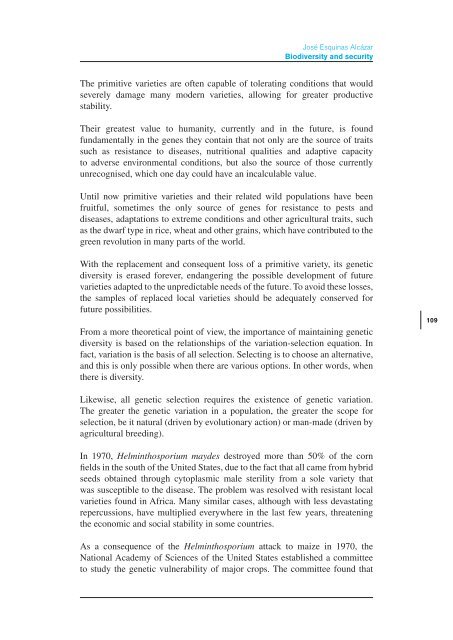Food security and global security - IEEE
Food security and global security - IEEE
Food security and global security - IEEE
- No tags were found...
You also want an ePaper? Increase the reach of your titles
YUMPU automatically turns print PDFs into web optimized ePapers that Google loves.
José Esquinas AlcázarBiodiversity <strong>and</strong> <strong>security</strong>The primitive varieties are often capable of tolerating conditions that wouldseverely damage many modern varieties, allowing for greater productivestability.Their greatest value to humanity, currently <strong>and</strong> in the future, is foundfundamentally in the genes they contain that not only are the source of traitssuch as resistance to diseases, nutritional qualities <strong>and</strong> adaptive capacityto adverse environmental conditions, but also the source of those currentlyunrecognised, which one day could have an incalculable value.Until now primitive varieties <strong>and</strong> their related wild populations have beenfruitful, sometimes the only source of genes for resistance to pests <strong>and</strong>diseases, adaptations to extreme conditions <strong>and</strong> other agricultural traits, suchas the dwarf type in rice, wheat <strong>and</strong> other grains, which have contributed to thegreen revolution in many parts of the world.With the replacement <strong>and</strong> consequent loss of a primitive variety, its geneticdiversity is erased forever, endangering the possible development of futurevarieties adapted to the unpredictable needs of the future. To avoid these losses,the samples of replaced local varieties should be adequately conserved forfuture possibilities.From a more theoretical point of view, the importance of maintaining geneticdiversity is based on the relationships of the variation-selection equation. Infact, variation is the basis of all selection. Selecting is to choose an alternative,<strong>and</strong> this is only possible when there are various options. In other words, whenthere is diversity.109Likewise, all genetic selection requires the existence of genetic variation.The greater the genetic variation in a population, the greater the scope forselection, be it natural (driven by evolutionary action) or man-made (driven byagricultural breeding).In 1970, Helminthosporium maydes destroyed more than 50% of the cornfields in the south of the United States, due to the fact that all came from hybridseeds obtained through cytoplasmic male sterility from a sole variety thatwas susceptible to the disease. The problem was resolved with resistant localvarieties found in Africa. Many similar cases, although with less devastatingrepercussions, have multiplied everywhere in the last few years, threateningthe economic <strong>and</strong> social stability in some countries.As a consequence of the Helminthosporium attack to maize in 1970, theNational Academy of Sciences of the United States established a committeeto study the genetic vulnerability of major crops. The committee found that
















